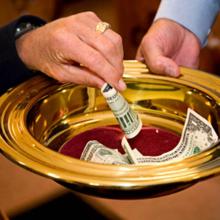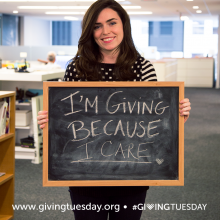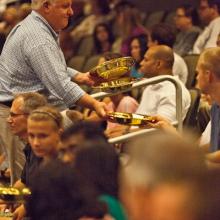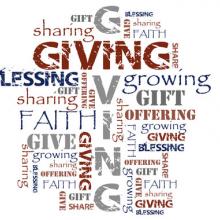giving
In seeking to better steward their resources, Christians may sometimes wonder how their giving to the poor and marginalized might better reflect God’s ultimate gift and sacrifice. The truth is that giving well and wisely isn’t easy – as givers from Andrew Carnegie to Warren Buffett have observed – and it requires wisdom and its own set of skills.
Overall, giving to religious causes amounted to close to a third of all charitable giving in 2016, Giving USA says. Religious institutions received $122.94 billion that year, or 32 percent of charitable donations. That figure is more than double the amount received by educational institutions, the next highest sector within nonprofits, which garnered $59.77 billion.

Image via Dobo Kristian/Shutterstock.com
3. Jesus already taught us how to tithe.
As I reflected on the practice of tithing more deeply, I realized that the parable in Mark 12 of Jesus recognizing the widow who offers two copper coins is one that influences my concept of discipleship — including monetary giving. It is cliché, because it is the lesson that is frequently read during budget meetings and stewardship drives. But the woman’s faith and commitment truly have been a reminder that it is not about how much I give, or even really whether I give anything. Jesus recognizes her sacrifice and discipleship, as evidenced through her monetary offering, and asks us to follow her lead.
Being a member of a church comes with many expectations. But so does being a Christian. A theological belief in salvation through grace alone roots my faith, but so does the action of giving of my time, talents, and earthly possessions to those who have less. I am both loved by God as an individual, and called to be in a community.

Anna Kurzweil, center. Image via Sally Morrow/RNS
Even people who knew Anna Kurzweil well wouldn’t have guessed she was a millionaire. She grew up on a farm outside of Kansas City, the youngest of eight children, and entered the convent for a few years but spent most of her life as a schoolteacher. She earned less than $20,000 a year, cared for her elderly mother, and eventually retired — on a pension of less than $1,000 a month. She died in 2012, just shy of her 101st birthday.

Image via Nadezhda1906 / Shutterstock.com
I've had the privilege of participating in a church’s Trunk-or-Treat program for kids in a low-income neighborhood in Cincinnati. Folks bring their cars and vans to the church’s parking lot and decorate them. They hand out candy to the kids, who come dressed in their costumes. There’s food and hot chocolate and books, all for free.
One regular attendee is a little boy who has no legs, so his mom pushes him around the parking lot in a wheelchair. He loves to dress like a ninja and if you ask why, he’ll go on and on about how much he loves ninjas and his costume. And how much he loves Halloween.
The kids make the route around the parking lot a few times with their bags open, getting another piece of candy and a little bit of love at each stop. Everyone enjoys the giving and the getting.
Maybe that’s what I love most about Halloween.
While there are no biblical texts speaking directly to the issue of money in politics, biblical principles are still relevant, and people of faith have an important role to play in the emerging debate about the future of our democracy. Before exploring those principles, however, it is important to understand the serious issues of inequality currently present in our system, and the correlation between inequality and the money flooding our political system.
The richest 1 percent own more of the nation’s wealth than the bottom 90 percent. The richest one-tenth of one percent have as much pre-tax income as the bottom 120 million Americans.
In Affluence and Influence, political scientist Martin Gilens concludes that, “The preferences of the vast majority of Americans appear to have essentially no impact on which politics the government does or does not adapt.” He details the data throughout his book that clearly demonstrates policy makers are only listening to the wealthy donor class. This situation has been made even worse by the Supreme Court’sCitizens United in 2010, which allowed a huge influx of money to flood our political system after declaring the personhood of corporations.
The Court’s more recent decision in McCutcheon v FEC made matters even worse. Before McCutcheon, one person was able to contribute up to $123,000 to political candidates and parties. In striking down this aggregate limit, the Court paved the way for individuals to contribute more than $3.5 million directly to candidates and party committees. In a report detailing the potential impact of McCutcheon, Demos predicts the decision could result in more than $1 billion in additional campaign contributions by 2020.
Nearly one in three Americans, including many with no little children at home and those with no religious identity, say they pretend Santa will visit their house on Christmas Eve.
Overall, 31 percent of U.S. adults play up the Santa role in their holiday season, according to a survey released Wednesday by the Pew Research Center.
Jesus, however, is still the star of Christmas.
Have you ever given someone a gift knowing that person probably wasn’t going to keep it? You had no idea what to give, so you gave something — a sweater, let’s say, even though you knew the recipient had more than enough sweaters — along with a gift return receipt.
That’s kind of how God gives, isn’t it? No, no, not the sweater part. The part about giving and then letting the others choose what they’ll do with the gifts.
Isn’t that how God gives to us?
And if we’re to be like God, shouldn’t we be giving the same way?
This is a challenging question, but one that’s relevant at this season of giving. Do we give with no strings attached? Or do we give with conditions? Do we give only to those we deem worthy?
“Gray” Thursday, Black Friday, Small Business Saturday, Cyber Monday — and Giving Tuesday? For the second year in a row, nonprofits, businesses, and individuals are coming together to create a national day of giving on the Tuesday after Thanksgiving.
Why a national day of giving? Last year, New York’s 92nd Street Y, with the support of the United Nations Foundation, catalyzed the idea of adding a national day of giving to kick off the holiday giving season. The goal was to drive donations of time, money, or services to charities with the same enthusiasm that shoppers have on the shopping days surrounding Thanksgiving.
Invest in the transformation of lives by trying some of these fair trade, eco-friendly gift ideas or charities.
WASHINGTON — Collection plates are growing even lighter as Protestant church member giving reached new lows in 2011, and tithing probably will not recover from the recession, according to a new report by Empty Tomb, a Christian research group.
“Is the issue that the church is not providing an authentic alternative to the consumer mindset?” said Sylvia Ronsvalle, executive vice president of Empty Tomb. “Over a period of time, if the church isn’t providing more of an authentic alternative, the church will lose.”
The percentage of a church member’s income given to the church dropped to 2.3 percent in 2011 (the latest year for which numbers are available), down from 2.4 percent in 2010, according to the Empty Tomb study.
As has happened many times after I have given a talk about the Body of Christ’s responsibility to care for their brothers and sisters experiencing impoverished and dehumanizing conditions, I was asked to answerthose questions — the ones in my experience that are always the first to be asked the moment I stop speaking.
“How will I know I have given enough? How does the church balance financial responsibility with service to the poor? Where do we draw the line?”
These questions always come, sometimes spoken in a curious tone by a person whose heart is being convicted, sometimes in an angry accusing tone insinuating I must hate prosperity, sometimes privately as a whisper in my ear or in a personal email filled with insinuations about my sanity. What a preposterous proposal, that the Body of Christ in any particular location should be the first resource to its own community for spiritual, physical, and emotional well being! Don’t I know that such a mission is naïve and impossible to achieve? Most recently it was phrased like this: “I love this idea, but it is difficult to see benevolence funds go towards someone's electric bill when they smell like they smoked five packs of cigs before meeting with us; what do we do?”
One morning, I walked out the front doors of the center and turned down Jefferson Street toward the Ohio River. There, huddled in a circle beside the wall of our building, was a group of worn, ragged homeless men. I knelt down with them and said, "Hello."
One of the men smiled a toothless smile at me, reached into his coat, pulled out a bottle of Wild Irish Rose, took a swig, and passed it to me. "Here," he said. "Have a drink."
It was truly a John Irving moment. Here I was offering my alcoholic friend a “hello” and he offering his ministerial friend a drink. He was offering me the thing that was most important to him.
Religion is far too judgmental. Surveys show that many people think that, especially a new generation of young people who — more than ever before — are checking the “none of the above” religious affiliation box.
I get it. But religious leaders tend to be judgmental about many of the wrong things; they are not making moral judgments on the important questions. So I am going to be judgmental, as a religious leader, about something I just read.
A recent Harris International and World Vision poll showed that Americans plan to spend more this Christmas season on consumer gifts than they did last year, but give less to charities and ministries that help the poor. Many say they are less likely to give a charitable gift as a holiday present — a drop from 51 percent to 45 percent.
So we will have more Christmas presents this year, but less help for the poor. While retailers, economists, and politicians may rejoice at the news about higher consumer spending this year, the lower levels of support for the ones Jesus called “the least of these” should legitimately bring some moral judgments from the faith community.
Indeed, the Matthew 25 scripture that this text is taken from is one of the few and most judgmental passages in all the New Testament. About some things, Jesus was judgmental. The Gospel clearly says that how we treat the hungry, the thirsty, the stranger, the naked, the sick, and the prisoner, is how we treat Jesus. That’s is pretty judgmental, especially when you go on to read what will happen to those who ignore Jesus in this way.
But rather than just being judgmental, let’s do something about it. Let’s start “A Christmas Tithe.”
This morning, Madu walked the one kilometer path from his village to my house. He is married to Sirima and they have two children: four-year-old Sira, who they call Bonnie, and two-year-old Musa, who they call Papa. He told me that Papa had burned his hand and wrist in the morning cooking fire.
Maybe the path to civility and peace can be found somewhere along the path from my house to Madu’s village.
“Do you have any medicine for a burn?” he asked.
There is a hospital in our small town on the southwestern edge of Mali, but its small staff of doctors serve a large population of people without the use of technology, electricity, or even running water. Many times people come to me for help and healing before they go to the hospital because I have free first aid supplies, a generator, and a deep water well. I consulted my ragged copy of Where There Is No Doctor and turned to the section on the treatment of burns.
Dear God,
As my son Zeke says in his daily prayers, so I say in our prayer this morning, "Thank you for all of the good things in the world."
One of those good things happened to me when I stopped by the water company to pay my bill. I walked into the building and stopped at the receptionist's desk to borrow a pen to write the check. I heard a family behind me and turned a saw a small child leading her mother by the hand, a mother carrying a baby in the cradle of her arm. The child listened to her Mother speak to her in Spanish, then looked at the receptionist and asked in English, "Can you show us where to pay our bill."
Suddenly and surprisingly the child looked up at me and threw her arms around me in a happy hug. "Mr. Barton!" she said. "I'm glad to see you, Mr. Barton!"
Mitt Romney says in a new interview that one of the reasons he’s distressed about disclosing his tax returns is that everyone sees how much money he and his wife, Ann, have donated to his Mormon church, and that’s a number he wants to keep private.
“Our church doesn’t publish how much people have given,” Romney tells Parade magazine in an edition due out on Aug. 26. “This is done entirely privately. One of the downsides of releasing one’s financial information is that this is now all public, but we had never intended our contributions to be known. It’s a very personal thing between ourselves and our commitment to our God and to our church.”
Romney has released his 2010 tax returns in his White House campaign and, so far, a summary of last year’s tax information. But despite pressure from Republican opponents in the primaries and President Obama’s re-election campaign, Romney has refused to disclose more.
While it may not be a major reason, Romney says disclosing his charitable donations isn’t something he wants to do.
Atheists and others who don’t adhere to a religion often say they can be good without God. Now, three new studies appear to back them up.
Researchers at the University of California, Berkeley conducted three experiments that show less religious people perform acts of generosity more from feelings of compassion than do more religious people. The findings were published in the current issue of the online journal Social Psychological and Personality Science.
Their results challenge traditional thinking about what drives religious people to perform acts of kindness for others.
“The main take-away from the research is that there may be very different reasons why more and less religious people behave generously, when they do,” said Robb Willer, an assistant professor of sociology at Berkeley and a co-author of the studies.
This past weekend, millions of Americans crossed their fingers and tuned into the Mega Millions drawing, hoping that they would beat the odds and strike it rich. At my office, a pool was formed; I was the only one who opted out. Although it is good to dream, I did not want to waste my money on the slim odds. After the money was collected for the tickets, we went around the lunch table, and chatted about how we would all spend our Mega Millions. Nearly everyone mentioned giving away a significant chunk to charity.Of course, this is only the right thing to do, when one has so much money (their thought processes went).
This got me thinking ... Does it take $640 million to make a difference? What does it say about us, Americans, who live in the world's richest country – that we view radical generosity as a “rich person thing” for a later time?
A small Minnesota church is finding out the high cost of standing up for same-sex equality — as well as an unexpected lifeline from the very people it decided to support.
When the Rev. Oliver White voted in favor of the United Church of Christ's endorsement of same-sex marriage in 2005, 72 percent of his predominantly African-American flock at Grace Community United Church in St. Paul couldn't stand with him.
The UCC's 2005 vote, he said, was "the beginning of the end of many UCC churches." Predominantly black churches like his suffered the most, he said, because the black community "was, and still is, very homophobic."
Because of White's vote, his church developed a reputation of being a "gay church" and people stopped coming. And stopped giving.















